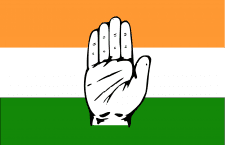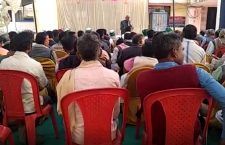Asking where the women are, on buzzing counting day in Madhya Pradesh
On December 11, the country’s eyes were on Madhya Pradesh as 51 polling centres crunched the numbers of votes cast earlier this year for the state assembly elections. Incumbent party BJP and the Congress were in a head-to-head battle until the last minute; the seat-count in favour of each party see-sawed wildly through the day. It was a nail-biting, hair-raising kind of roller-coaster experience that many locals experienced in the real time, outside vote counting centres until the final victory lap was firmly placed with the Congress. Crowds gathered, of both young and old, from near and far, favouring different political parties—but it was a sea of men.
Where were the women?
“They must be busy with housework,” said Urmila, busy at work herself, barely audible over the din of the sewing machine she was operating.
“I’m busy with my work, when do we ever get a holiday?” said Sadhna Pande, a Satna resident, jokingly. “I had gone there for some time, but I have work at home to take care of now,” said Satbhavana Soni, another Satna local.Anita from Panna was on her way to the grocery store when she said, “I know counting is happening, but I’ve come from home, to run some errands.” When asked if she didn’t want to listen to the vote count, she didn’t answer the question, simply saying, “I don’t have the time.”
The statement might as well be preceded by ‘I wanted to but’— a fact apparently true for a lot of the women in the state. “I wanted to but couldn’t go to listen to the vote count”, said Chhatarpur resident Siyarani, “Because I got caught up in work”. Sandhya from Panna expressed an anxiety navigating the male-dominated crowds, “Maybe if some women had gone together in a group I would have gone. I couldn’t have gone alone, with these hordes of men.”
And hordes there were. Roads, public bus stops, marketplaces around the speakers near the counting booths were filled with men. There were groups of loud discussions, laughter, rallying cries, and there were men just sitting around—but there were really only men.
While speaking to our reporter in Satna, they expressed their concerns, predictions and aspirations for competing parties as their fates were being decided in that moment. Baijnath Patel said, “We need Congress because we need change. Just like you can only cook one side of a roti for sometime before it burns, the government needs to be flipped as well.” A BJP supporter immediately dismissed that, “We don’t need change. All the good that has ever happened in this state was because of the BJP.” Many argued the merits of individual candidates. Others brought up issues that they cared about—Ram SurukNayak was concerned about unemployment; a college student worried about the status of sports players in their district; a man illustrated the dire state of healthcare in his district with no doctors available in public hospitals.
But markedly absent from all of this discussion was the voice of women—there was no way to gauge the issues they were interested in, nor were any issues that specifically concerned women brought in the fold.
Women used their voice when the state went to the polls earlier this year though – on November 28, 2018. The female voter turnout increased in the state from 70.11% in the 2013 elections to 74.03% in 2018. Some districts saw a female voter turnout as high as 83.72%. These elections even managed to bridge some of the worrying gap between male and female voters turnout—it came down from 3.84% in 2013 to 1.95% this year.
“Yes I voted”, said an under-the-weather Rajbai, from Panna, “But I don’t want to hear the results. What place do I have, as an uneducated woman, among those crowds?” Bharti was on her way to take care of her father who was admitted into the hospital; she said, “My husband and sons have gone to listen, that’s enough”.
This speaks volumes of the gendered perception of space. The realm of the domestic, the home, is the woman’s—but the world outside is the man’s. Women often venture out into the public space with purpose—to go to the hospital, in Bharti’s case, or the shops in Anita’s. Their presence is constantly monitored and policed; they are curtailed in the name of safety and honour. The vote counting, which began at 8 am and was on for the rest of the day, required loitering; it required women to not only simultaneously shirk the responsibility of the invisible labour of housework and family care, which is work with breaks and holidays, and it required women to unapologetically occupy public space.
“Women are not thought to be appropriate enough to attend these events by many people,” Desh Rani minced no words as she spoke, standing confidently in a crowd of men. It’s easy to see why some women believed the invisibility of their gender during the counting was because husbands didn’t let their wives go, or that the police restricted women’s access—because of the potential of their presence to unsettle socio-cultural norms.
Some women made a conscious decision to come anyway. Supma Sinha travelled more than 120 kms to hear the counting. “I am a party president, so I’ve developed more interest in these things.” She in fact dragged a party candidate out with her—“I also wanted one of my party’s candidates be a part of the assembly elections, so I brought him”.
Others followed the counting closely, despite proximity barriers. “I’m listening to the news on TV,” said Sadhana Pande. “I’m getting the information about the vote count, anyway,” said Soni, “from what people are telling me”. “Women are so busy with taking care of the family but still they are listening to the news, through the men who are here,” said Seema Rani, the District Director of the BJP present at the counting, “So they may not come but they know what’s happening here.”
“Without the full context, I don’t know what’s really happening,” countered Siyarani. Her comment was a stark reminder that the concern with missing women during this vote count is not frivolous. It was one of the many parameters by which women engage with the democratic framework of the state. Women are heavily outnumbers in the Indian politics, in courts, in the police force. It is easy to see just how disenfranchised one could feel. Like Phulbati stated: “Just because we elect someone to the seat of power doesn’t mean they listen to us”.
And as the state was the focus of national media because of the tight race where every new vote counted was tipping the scales, Ram Kumari was just nearby buying vegetables, halfheartedly listening to the announcements. “To be frank, I don’t know anything about the elections.”
Women must prioritize—and family always comes first.
“Of course they should come,” said Seema Rani, before she added, “if they can spare the time”.
This Khabar Lahariya article first appeared on Firstpost.

